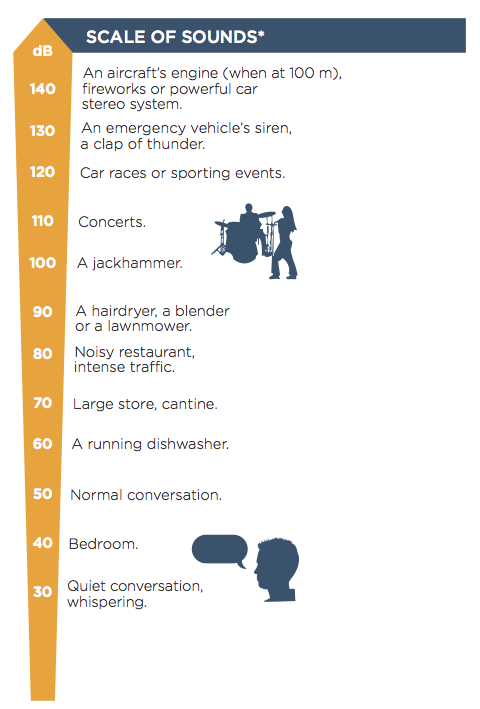
The myths and facts about noise induced hearing loss
These days, noise pollution is all around us. Whether in the city or outside of it, volumes can reach critical levels. While most people understand there are certain risks to hearing, many myths persist about hearing loss caused by noise. Here are some explanations and reference decibel levels of common sounds in our environments.
Only very loud noise over a long period of time is dangerous.
FALSE! Noise can be harmful when it is loud over a long period of time or when it is loud and sudden. Do not take the power of noise lightly, no matter how long the exposure!
People with hearing loss can completely regain their hearing if they are careful about their exposure over a long period.
FALSE! Unfortunately, hearing loss is irreversible, because the cells lining our ears do not regenerate. Vigilance and caution are needed BEFORE hearing loss occurs, through the adoption of healthy habits. When your hearing is damaged, a visit to a professional is needed.
Adapted hearing protection helps maintain hearing.
TRUE! Indeed, proper hearing protection that is adapted to an individual’s needs reduces the intensity and strength of harmful ambient noise. To have the intended effect, this protection must be used correctly and whenever exposed to noise.
The noise level is considered dangerous if I have to yell to be heard.
TRUE! Having to yell to be heard is a sign that the ambient sound level is dangerous. Experiencing tinnitus after exposure to loud noise (like after a concert) is a sign that hearing protection might be necessary if you can’t move away from the noise.
Given these facts, how do we understand ambient noise and what guidelines should we follow to maintain healthy hearing?
It has been shown that hearing damage can be triggered by 8 hours of exposure to sounds exceeding 75 decibels. The louder the noise, the greater the need to decrease exposure time. Here are some examples on the sound scale to serve as references.

*Note: The noise level depends on the distance between the person and the source of the sound.
Prevention is the only way to avoid noise-induced hearing loss. In addition, people over 60 should have their hearing checked regularly since exposure over time is a significant risk factor for decreased hearing acuity.











Leave a comment
Be the First to Comment!